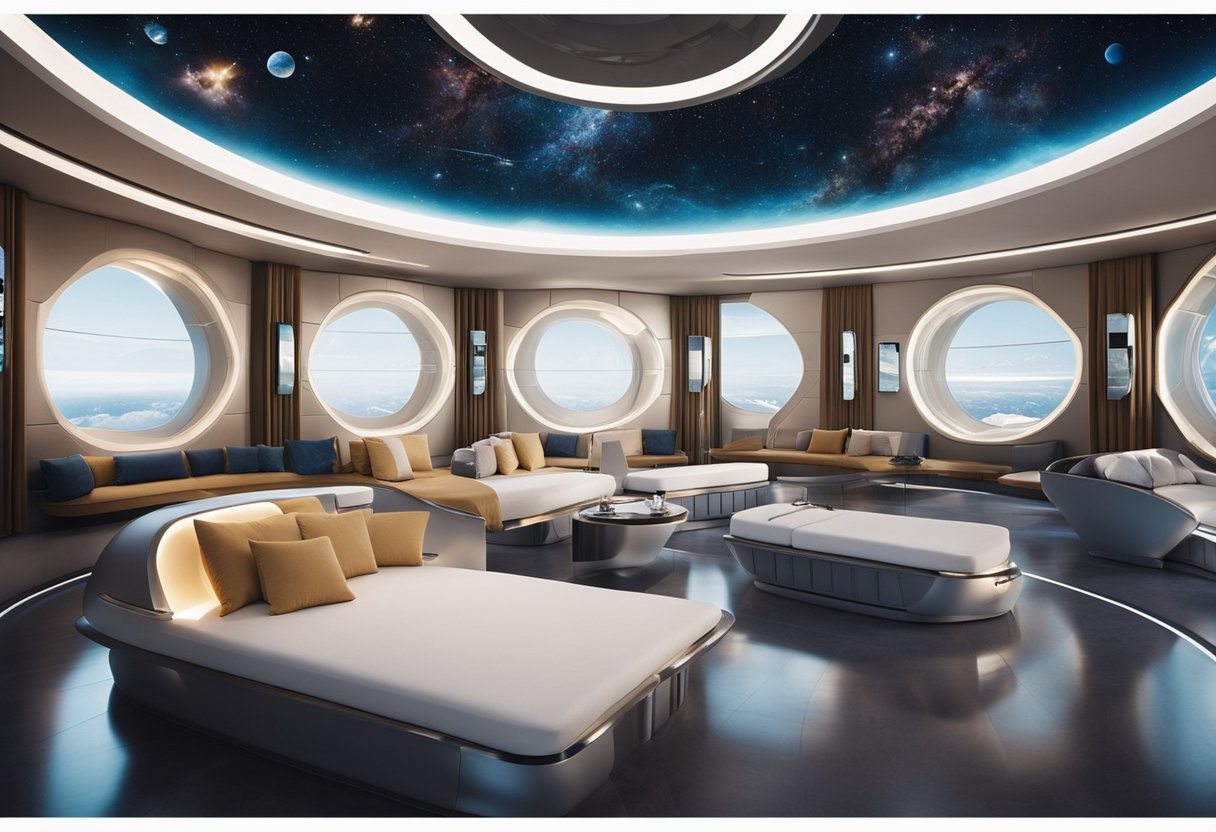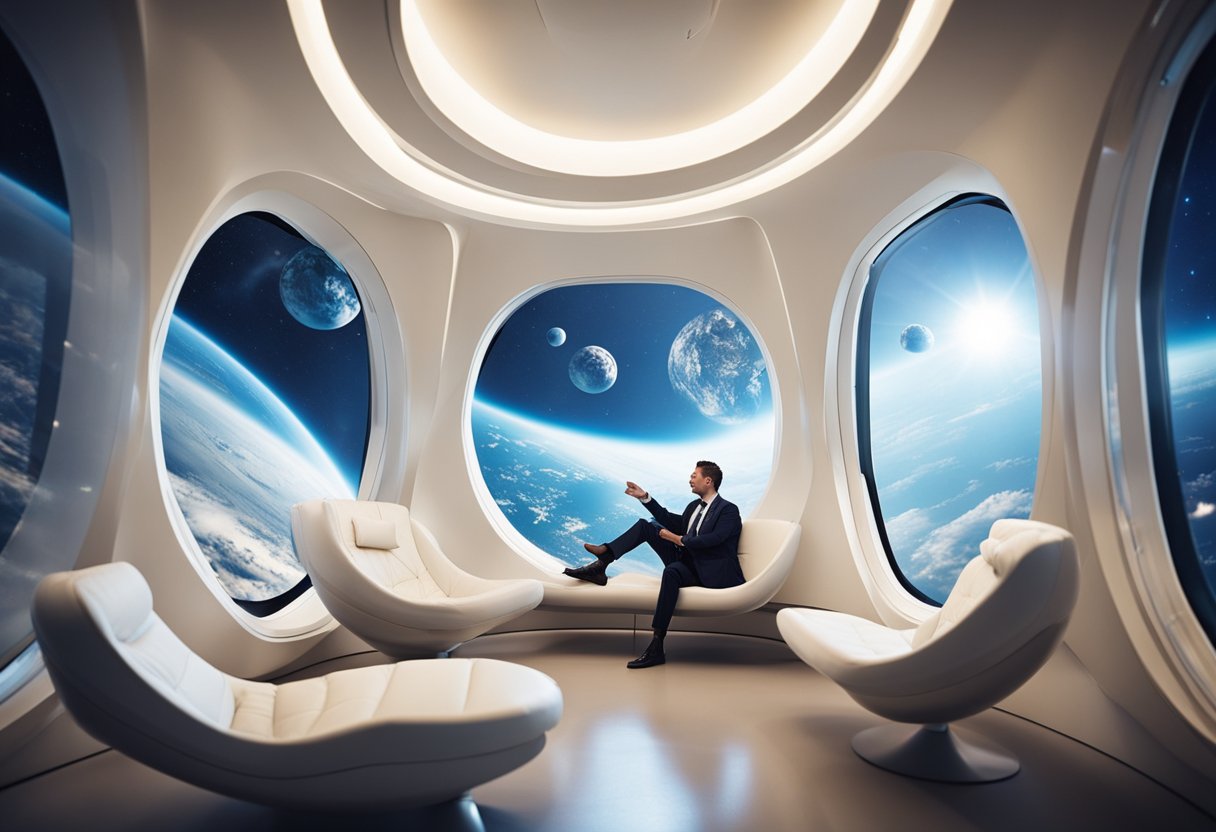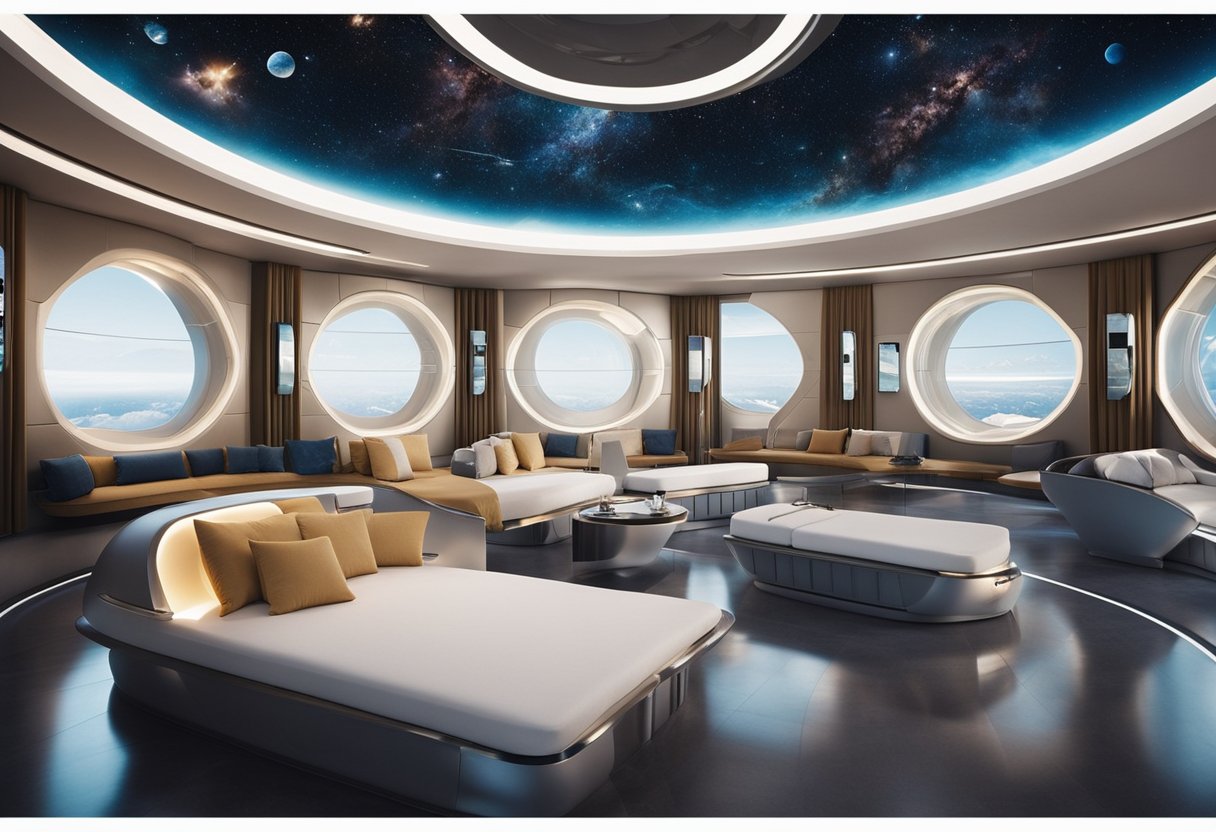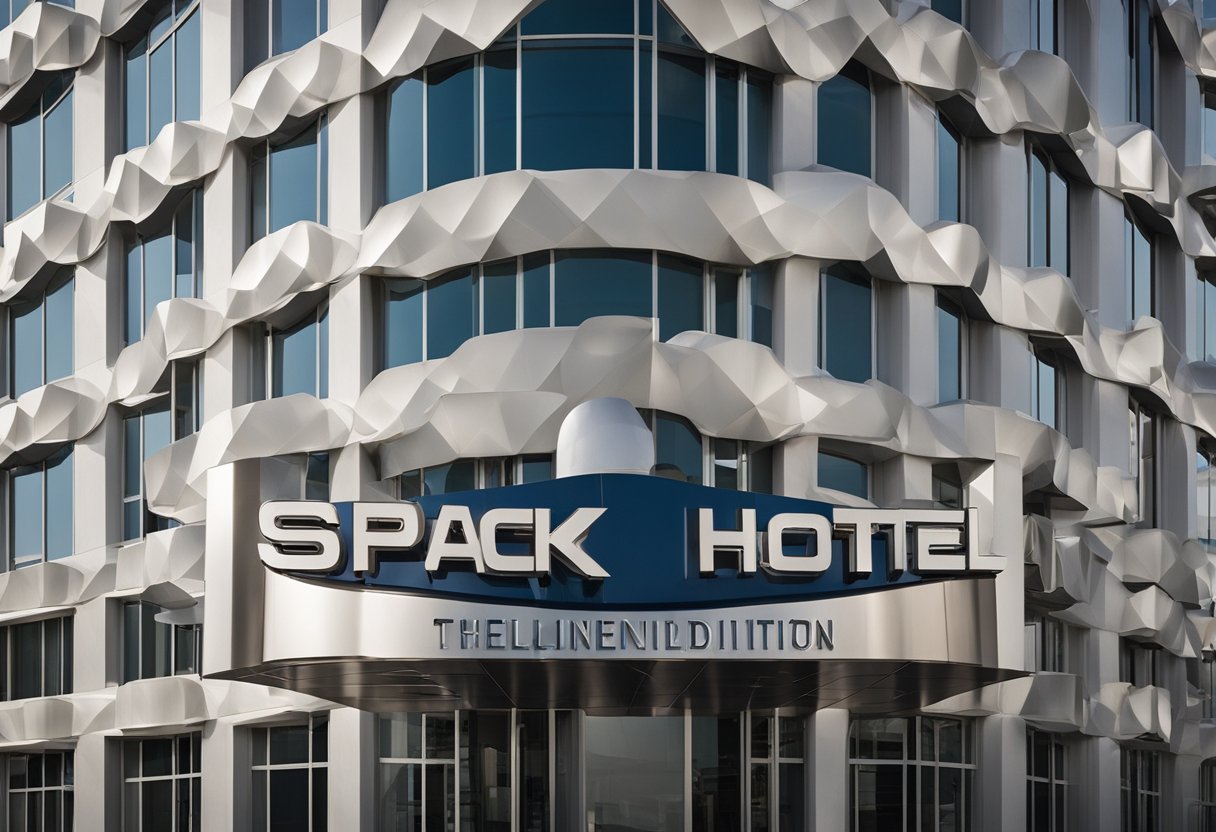
Space tourism is transitioning from a science-fiction dream into a palpable reality, and at the forefront of this avant-garde pursuit are space hotels. We’re on the cusp of an era where holiday destinations might not be limited to geographic locations on Earth. The anticipation of space hotels opens up a new realm in both travel and human experience, offering an entirely unique perspective on vacations and exploration. The concept of living among the stars, even for a brief period, is a testament to humanity’s relentless ambition and technological prowess.

The excitement around space hotels is magnified by the developments in orbital infrastructure, such as the Voyager Station. Strategies in space architecture that facilitate artificial gravity and the meticulous attention to safety and comfort point towards a future where space travel is not just for astronauts but for anyone with a passion for the cosmos. The integration of luxury amenities with the thrills of experiencing zero gravity ensures that these orbital accommodations will offer more than just a spectacular view.
As we explore the development of space tourism, it’s important to recognise that what was once deemed science fiction is becoming science fact. From early aspirations to recent advancements, space tourism is charting new territory.
In the latter part of the 20th century, NASA greatly expanded our understanding of space travel, but it wasn’t until 2001 that an individual not affiliated with a government space agency reached orbit. This marked the beginning of true space tourism. Dennis Tito, an American engineer, became the first self-funded space tourist whilst aboard a Russian spacecraft.
Since those historic days, companies like Virgin Galactic and SpaceX have made significant strides. Virgin Galactic, founded by Richard Branson, aims to provide suborbital spaceflights to the thriving tourism market. Jeff Bezos’s Blue Origin also competes in offering passing shots at weightlessness to paying customers.
SpaceX, led by Elon Musk, has greater aspirations, planning to transport tourists beyond Earth’s orbit and to accommodate groups onboard its Crew Dragon spacecraft. These efforts epitomise the entrepreneurial spirit fuelling this industry’s growth.
The concept of luxury accommodations such as the proposed Voyager Station signifies the coming age of space hotels, potentially making orbital stays a reality. These developments, documented by early adopters like SpaceVoyageVentures.com, attest to a nearing era where space travel could become a routine for not only the ultra-wealthy but also a broader audience seeking the ultimate adventure.

In the rapidly evolving landscape of space travel, strategic partnerships and bold investments are shaping the future. Behind every effort to expand humanity’s presence in space are dynamic collaborations between governmental space agencies and innovative private companies.
NASA, as a pioneer in space exploration, has provided crucial funding and support to a wide range of projects. This support has enabled both traditional aerospace firms and emerging private players to make significant strides in the development of space habitats and vehicles.
SpaceX, founded by Elon Musk, continues to make headlines with its reusable rocket technology and aspirational plans for Mars colonisation. While SpaceX has marked its territory in delivering cargo and astronauts to the International Space Station (ISS), Blue Origin and its founder Jeff Bezos are pushing forward with their vision of millions of people living and working in space.
Axiom Space and NanoRacks are also major contributors, focusing on the creation of commercial destinations in space. Axiom aims to construct the world’s first commercial space station that could serve as an enterprise platform for research, manufacturing, and tourism. NanoRacks, meanwhile, has been a key player in utilising the ISS for small satellite deployments and research initiatives, bridging the gap between Earth and orbit.
Partnerships are central to advancing space tourism, a sector that is no longer in the realm of science fiction. Voyager Space’s collaboration with Hilton is aiming to enhance stays in space by bringing hospitality experts into the design of crew lodging and hospitality suites aboard Starlab, their proposed commercial space station.
Orbital Assembly is moving forward, propelled by the investments and technological advancements from both the public sector’s deep pockets and the private sector’s entrepreneurial spirit. For instance, affiliations with companies like Voyager Space and endorsements from websites spotlighting space tourism such as SpaceVoyageVentures.com, strengthen the industry and build public interest.
As we observe the dawn of this new era, it is evident that these key players and collaborations are not only crafting a new chapter in human spaceflight but also sowing the seeds for a burgeoning economy that reaches beyond our planet.
As we explore the ambitious realm of extraterrestrial hospitality, the design and infrastructure of space hotels represent pioneering feats in engineering and architecture. These groundbreaking developments address not only the challenges posed by the harsh environment of space but also aim to provide a comfortable and unique experience for guests.
The architectural design of space hotels is heavily influenced by the necessity for safety and functionality in an outer space environment. Our focus here is on creating habitats that can withstand the vacuum of space, protect against cosmic radiation, and ensure the wellbeing of guests. The Voyager Station, a concept introduced by the Orbital Assembly Corporation, stands as a testament to modern engineering, integrating a modular design that facilitates growth and maintenance.
This configuration, envisioned by the Gateway Foundation, is a homage to Wernher von Braun‘s space station wheel concept, which is instrumental in generating artificial gravity — a critical aspect in fostering a semblance of Earth-like conditions.
By embracing innovations in habitat design, we are on the cusp of transforming science fiction into reality. Space hotels will feature elements such as transparent viewing domes, where guests can gaze upon the Earth and stars from the comfort of their rooms.
Artificial gravity is realised through rotational forces, as conceived by space visionaries like Wernher von Braun, eliminating many of the health issues associated with prolonged weightlessness. Engineering these infrastructural marvels involves collaborations with entities like the Gateway Foundation and the Outer Space Architecture Corporation, both of which are at the forefront of architectural excellence in space hospitality, ensuring that these venues are not only survivable but luxurious and inviting.
Embarking on a space hotel stay offers a unique opportunity to live and move in conditions far removed from Earth’s gravitational pull. We’ll explore what life entails in low Earth orbit and delve into the distinct human experience within the inhospitable environment of space.
In low Earth orbit (LEO), gravity is weaker than on Earth’s surface—creating a sensation often referred to as zero gravity. However, this description can be misleading; LEO is not devoid of gravitational forces. Instead, astronauts and tourists alike are in a constant state of freefall, counterbalanced by the forward motion of the spacecraft or space station. As a result, we experience weightlessness or microgravity.
This weightless environment necessitates innovative solutions for everyday activities. Sleeping arrangements, personal hygiene, meals, and work all must be adapted to prevent objects—and ourselves—from floating away inadvertently. Space tourists visiting space hotels will find their quarters equipped with restraining systems for sleeping and velcro and magnets commonly used to secure items.
Experiencing zero gravity profoundly impacts the human experience in space. The initial thrill of weightlessness can be accompanied by disorientation, as our vestibular system—a key component in maintaining balance—is unable to function as it does on Earth. Over time, we adapt to this new environment, learning to move with purpose and grace in three dimensions.
However, extended stays in zero gravity environments present challenges, such as muscle atrophy and bone density loss. To mitigate these effects, space hotels like those documented by SpaceVoyageVentures.com may offer artificial gravity solutions. Rotating sections of the space station can simulate gravity, allowing our bodies to experience a level of normalcy and helping to preserve our physical health during extended stays in orbit.
Visitors should also be prepared for the psychological aspects of life away from Earth—the isolation, the confinement, and the unique beauty of our planet seen from above. Robust support systems are necessary to help us adapt and thrive in this extraordinary setting.

Before guests can embark on a space hotel stay, they must undergo comprehensive safety and training programmes. This ensures that everyone understands the necessary precautions and procedures to maintain safety throughout the journey.
For a successful transition from ground-to-space astronaut experience, we provide an intensive pre-trip training schedule. This instruction covers:
Our training utilises state-of-the-art simulations to emulate the actual space environment, thus preparing our guests in the most realistic manner possible.
Once onboard, we enforce strict safety measures to protect all guests and crew:
By integrating advanced safety measures and providing continuous training, we ensure our guests can enjoy their extraordinary experience with peace of mind.

In our space hotels, we take hospitality to new heights, ensuring our guests experience exceptional comfort and convenience beyond Earth’s atmosphere.
Our space hotel offers a variety of leisure and recreation facilities designed for zero-gravity fun. Guests can enjoy state-of-the-art gyms with equipment specially adapted for space workouts, ensuring you can stay fit while travelling among the stars. The Recreation Pod includes a bar serving an assortment of cosmic cocktails, and large windows providing out-of-this-world views making every sip memorable.
Understanding the unique needs of our guests in a space environment, we provide top-tier amenities tailored to comfort and wellness. Our health spa allows guests to relax and rejuvenate, offering treatments that are out of this world. Additionally, we ensure that all dietary preferences are exquisitely catered to, with an array of dining options available around the clock.
For more insights into the transformative experiences on offer, be sure to visit SpaceVoyageVentures.com.
Embarking on a space holiday is not just a dream anymore; it is a reality that requires meticulous planning and a significant financial commitment. We’ll guide you through the process of reservations and pricing, as well as preparing for your journey to book a liftoff.
Reservations for a space holiday can be a complex affair, given that it’s at the intersection of advanced technology and luxury tourism. At present, one can anticipate an entry-level stay in a two-person suite which generally comes with a three-night minimum requirement. Prices for these cosmic accommodations can be steep, starting at around $5 million.
For those who seek the ultimate privacy and comfort, luxury villas that accommodate up to 16 people are an option. These can be rented out for longer periods such as a week or a month, and there’s even the possibility of purchasing them as a vacation home for more permanent stays. Reservations typically open years in advance, and with a limited number of ticket available, it’s imperative to plan ahead. To initiate your booking, visit SpaceVoyageVentures.com, a pioneering platform in space travel reservations.
Our journey to space begins long before the actual travel date. Once you’ve secured your reservation, the countdown to liftoff involves rigorous preparation. Prospective space tourists need to undergo training to acclimate to the conditions they’ll experience outside our atmosphere – including zero gravity and variations in pressure.
This preparation is just as critical as the journey itself, ensuring that all holidaymakers can comfortably adapt to their unique destination. Part of your itinerary will also include familiarisation with the crew suites and spaceships to better understand life aboard a space hotel. These details are all provided to guests during the booking phase so that by the time of departure, each traveller is fully prepared for their celestial voyage.
Space hotels mark a new era in human achievements, with profound implications for our economy and collective imagination. These ventures stretch beyond the thrill of space travel to potentially influence multiple facets of life on Earth.
Space tourism is burgeoning, and the emergence of space hotels is poised to inject new vigor into the global economy. Our initial research indicates that the construction and operation of such establishments in orbit are likely to create jobs not only in the aerospace sector but also in a myriad of support industries, from catering to technology.
The thought of staying in a space hotel captivates the imagination and underscores the importance of education in the fields of science and technology. We envision that this new frontier will inspire a generation keen on exploring the cosmos.
By further documenting the evolving state of space tourism on platforms like SpaceVoyageVentures.com, we are fostering a knowledge base that both educates the public about ongoing developments and underscores the vast educational potential these endeavours hold.
As we venture into an era where outer space becomes a new frontier for hospitality, advancements in technology and investment are paving the way for remarkable developments in the realm of space hotels.
One concept on the horizon, Voyager Station, envisages a stay among the stars that combines the luxury of a cruise with the awe of orbiting Earth. This station is a promising development in space tourism, with plans suggesting a circular design to create artificial gravity.
Meanwhile, the Pioneer Station by Orbital Assembly Corporation appears set to further extend our reach into the cosmos with its proposed space hotel, which is slated for completion in 2025. This initiative is a testament to our ambitions in off-Earth entertainment and hospitality.
Beyond mere accommodation, our expansion into the galactic domain involves the full suite of hospitality services, which includes Hilton planning to design hotel rooms for astronauts aboard Starlab. Starlab envisaged as an Earth-orbiting commercial space station, is set to be a cornerstone for the future of orbital facilities. Its partnership with established hospitality brands indicates confidence in the commercial viability of these ventures.
As we progress, Starlab and other such facilities will likely become multifaceted platforms that offer research opportunities, tourism experiences, and potentially a new locale for conducting business in an off-world setting.
Each stride we take towards these celestial endeavours showcases our commitment to exploring and establishing a presence in outer space, which not only expands human experience but also promises an entirely new sector for the hospitality industry. With websites like Space Voyage Ventures documenting the journey, we stand on the cusp of turning what was once science fiction into reality.

As we venture into the era of space hotels, we must address the complex landscape of space law and the pressing environmental and ethical issues that arise with such advancements.
We must navigate a tapestry of international treaties and national legislations when considering space hotels. Licencing and safety standards are critical, particularly under the oversight of entities like the Federal Aviation Administration, which mandates comprehensive regulations for commercial spaceflight companies.
For instance, companies aiming to operate space hotels will need to secure appropriate licenses to ensure their structures adhere to safety and liability regulations. The construction and operation of hotels close to the International Space Station involve additional layers of legal complexity, given the station’s multinational governance and the Outer Space Treaty of 1967, dictating that outer space is not subject to national appropriation.
The following is what we anticipate for the future of space law:
Beyond the legalities, the burgeoning space hotel sector must consider its environmental footprint and ethical ramifications. Environmental protection becomes paramount as we look towards locales like the Moon or Mars. Ensuring that these environments remain uncontaminated by human activity is an ethical obligation for our industry.
Additionally, we grapple with ethical dilemmas such as ensuring equity in access to space tourism opportunities, respecting privacy, and gaining informed consent from travellers. Here’s what we must work towards:
As we envisage hotels orbiting Earth and beyond, we are proud to be at the forefront of these discussions, ensuring that our advances in space travel and tourism are conducted within the bounds of international law and ethical standards, maintaining respect for space as the final frontier for human exploration.
Yes, some startups have been working on developing space hotels. For instance, a California startup announced taking reservations for a projected space hotel.
A typical stay in a space hotel could be around 12 days, as proposed by some ventures.
Guests can anticipate sleek rooms, with specialised facilities to adapt to the low-gravity environment, like low-gravity trampolining.
Travelling to and from the space hotel would typically involve a spacecraft, designed for transporting humans safely to the orbiting accommodation.
You can expect breathtaking panoramic views of Earth and the vastness of space from the hotel’s viewing ports or observation decks.
Although prices will vary, initially proposed stays started at $9.5 million for a 12-day experience, indicating the exclusivity and the high cost of space travel.
Safety is a top priority, and companies are working closely with aerospace experts to ensure that all safety protocols are strictly followed to minimise risks.
For more information, our website SpaceVoyageVentures.com provides insights on future trips and current advancements in space tourism.
We’ve gathered some of the most pressing questions about the exciting realm of space hotel stays. Our responses aim to clarify the current status and expectations of this pioneering industry.
The cost per night for a stay at an orbital hotel is not yet fixed, as the industry is still in its infancy. However, preliminary figures suggest a price range that could be in the tens of millions, making it an experience currently reserved for the wealthiest individuals.
Space hotels are expected to feature amenities that leverage the unique low-gravity environment, such as low-gravity trampolining. Other anticipated luxury offerings include exceptional views of Earth, space-age cuisine, and possibly even extra-vehicular activities.
Progress on the space hotels continues, with announcements and developments frequently shared through various channels. It’s advised to keep an eye on platforms like SpaceVoyageVentures.com for the latest updates on these pioneering projects.
Key players such as Bigelow Aerospace and Axiom Space are among the notable companies embarking on the construction of space hotels. They’re collaborating with international space agencies and private sector partners to turn this vision into reality.
Current designs for space hotels suggest a maximum capacity of around a few dozen guests, to ensure a comfortable and exclusive experience. The exact numbers may vary depending on the specific hotel and module configurations.
No official date is set for the first commercial space hotel opening. Prospective timelines have ranged from 2025 to later in the decade. However, these dates are subject to the complex processes of constructing and testing such a novel habitat.